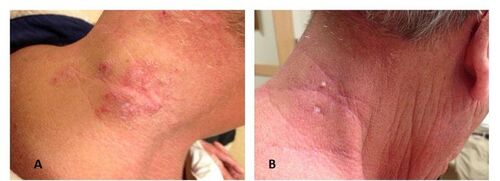Carmustine
 | |
| Names | |
|---|---|
| Trade names | BiCNU, Gliadel, others |
| Clinical data | |
| Drug class | Antineoplastic agents |
| Main uses | Brain tumors, multiple myeloma, lymphoma, melanoma[1] |
| Side effects | Nausea, kidney problems, lung inflammation, bone marrow suppression[2] |
| External links | |
| AHFS/Drugs.com | Monograph |
| MedlinePlus | a682060 |
| Legal | |
| License data |
|
Carmustine, sold under the brand name BiCNU among others, is a medication used for cancer.[1] Specifically it is used for brain tumors, multiple myeloma, lymphoma, and melanoma.[1] It may be used as palliative chemotherapy.[2] It is generally used by injection into a vein or as part of an implant in the brain.[1]
Common side effects include nausea, kidney problems, lung inflammation, and bone marrow suppression.[2] Other side effects may include secondary cancers, hair loss, and allergic reactions.[2][3] Use in pregnancy may harm the baby.[2] It is a nitrosourea compound and alkylating agent.[1]
Carmustine was approved for medical use in the United States in 1977.[1] In the United States it costs about 2,800 USD per 100 mg dose as of 2023.[4] In the United Kingdom implants cost the NHS about 650 £ each as of 2021.[3]
Medical uses

Carmustine is used as an alkylating agent to treat several types of brain cancer including glioma, glioblastoma multiforme, medulloblastoma and astrocytoma), multiple myeloma, and lymphoma (Hodgkin's and non-Hodgkin).
Carmustine is sometimes used in conjunction with alkyl guanine transferase (AGT) inhibitors, such as O6-benzylguanine. The AGT-inhibitors increase the efficacy of carmustine by inhibiting the direct reversal pathway of DNA repair, which will prevent formation of the interstrand crosslink between the N1 of guanine and the N3 of cytosine.
It is also used as part of a chemotherapeutic protocol in preparation for hematological stem cell transplantation, a type of bone marrow transplant, in order to reduce the white blood cell count in the recipient.[5] Use under this protocol, usually with fludarabine and melphalan, was developed by oncologists at the University of Texas MD Anderson Cancer Center.[citation needed]
Implants
In the treatment of brain tumours, the U.S. Food and Drug Administration (FDA) approved biodegradable discs infused with carmustine (Gliadel).[6] They are implanted under the skull during a surgery called a craniotomy. The disc allows for controlled release of carmustine in the extracellular fluid of the brain, thus eliminating the need for the encapsulated drug to cross the blood-brain barrier.[7]
Mechanism of action
As an alkylating agent, carmustine can form interstrand crosslinks in DNA, which prevents DNA replication and DNA transcription.
Production
Carmustine for injection was marketed under the name BiCNU by Bristol-Myers Squibb[8] and now[when?] by Emcure Pharmaceuticals.[9] In India it is sold under various brand names, including Consium.[citation needed]. The product is available as a generic version with other manufacturers offering the product licensed in the US and EU markets.[citation needed]
See also
References
- ↑ 1.0 1.1 1.2 1.3 1.4 1.5 "Carmustine Monograph for Professionals". Drugs.com. Archived from the original on 17 August 2022. Retrieved 3 December 2023.
- ↑ 2.0 2.1 2.2 2.3 2.4 "DailyMed - CARMUSTINE- carmustine kit". dailymed.nlm.nih.gov. Archived from the original on 4 December 2023. Retrieved 3 December 2023.
- ↑ 3.0 3.1 BNF 81: March-September 2021. BMJ Group and the Pharmaceutical Press. 2021. p. 937. ISBN 978-0857114105.
- ↑ "BiCNU Prices, Coupons, Copay & Patient Assistance". Drugs.com. Archived from the original on 9 June 2023. Retrieved 3 December 2023.
- ↑ Damaj G, Cornillon J, Bouabdallah K, Gressin R, Vigouroux S, Gastinne T, et al. (July 2017). "Carmustine replacement in intensive chemotherapy preceding reinjection of autologous HSCs in Hodgkin and non-Hodgkin lymphoma: a review". Bone Marrow Transplantation. 52 (7): 941–949. doi:10.1038/bmt.2016.340. PMID 28112752.
- ↑ Ewend MG, Brem S, Gilbert M, Goodkin R, Penar PL, Varia M, et al. (June 2007). "Treatment of single brain metastasis with resection, intracavity carmustine polymer wafers, and radiation therapy is safe and provides excellent local control". Clinical Cancer Research. 13 (12): 3637–41. doi:10.1158/1078-0432.CCR-06-2095. PMID 17575228. Archived from the original on 2013-02-23. Retrieved 2021-06-23.
- ↑ "Hopkins Medicine Magazine - In Spite of All Odds". Archived from the original on 2014-11-20. Retrieved 2014-07-08.
- ↑ "Company Statement on BiCNU® (carmustine for injection)". Bristol-Myers Squibb Company. Archived from the original on 2014-07-11. Retrieved 2015-01-31.
- ↑ "Emcure Press release" (PDF). Archived from the original (PDF) on 2014-07-02. Retrieved 2015-01-31.
External links
| Identifiers: |
|
|---|
- "Carmustine". Drug Information Portal. U.S. National Library of Medicine. Archived from the original on 2021-06-18. Retrieved 2021-06-23.
- "Carmustine Implant". MedlinePlus. Archived from the original on 2021-08-17. Retrieved 2021-06-23.
- Pages using duplicate arguments in template calls
- Chemical articles with unknown parameter in Infobox drug
- Chemical articles without CAS registry number
- Articles without EBI source
- Chemical pages without ChemSpiderID
- Chemical pages without DrugBank identifier
- Articles without KEGG source
- Articles without InChI source
- Articles without UNII source
- Drugs missing an ATC code
- Drugs with no legal status
- Drugboxes which contain changes to verified fields
- Drugboxes which contain changes to watched fields
- All articles with unsourced statements
- Articles with unsourced statements from February 2018
- Articles with invalid date parameter in template
- All articles with vague or ambiguous time
- Vague or ambiguous time from December 2017
- Articles with unsourced statements from December 2017
- Articles with unsourced statements from February 2021
- Orphan drugs
- Ureas
- Nitrosoureas
- Alkylating antineoplastic agents
- IARC Group 2A carcinogens
- Organochlorides
- Cancer treatments
- Chloroethyl compounds
- RTT